Lab Alumni
Tianpeng Zhang, PhD
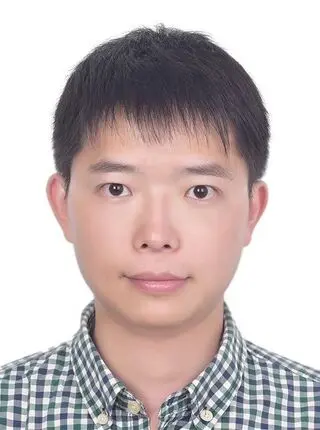
Dr. Zhang received his B.A. and Ph.D. from the Sun Yat-sen (Zhongshan) University, Guangzhou, China. He is devoted to understanding mechanisms underlying chromosome integrity and DNA damage response pathway choice at telomere and genomic DNA under different chromatin features. Dr. Zhang is also interested in cancer therapy: understanding mechanism for drug resistance, new use for approved drug and combination therapy. He received the Forbeck Scholar, William Guy Forbeck Research Foundation in 2019 for his work. While in the Greenberg Lab, Dr. Zhang published a paper that revealed an unexpected dominant role of ATR in hPSCs, combined with unique cell cycle abnormalities and, ultimately, consequences distinct from those observed in their isogenic differentiated counterparts (Vessoni T, Zhang T, et. al., J Cell Biol, 2021). In August 2024, Dr. Zhang became an Assistant Professor in the Department of Radiation Oncology at the University of Virginia Medical School.
Priyanka Verma, PhD

Dr. Verma received her Master’s degree in Biotechnology from the University of Pune, India, respectively. She was awarded a gold medal for securing the first rank in her Master’s exam. She went on to obtain her PhD in Biochemistry from the National Institute of Immunology, India.
In the Greenberg lab, Dr. Verma’s research focused on understanding how BRCA-mutated ovarian cancer cells rewire their DNA repair mechanisms to survive the functional loss of BRCA proteins. Understanding these compensatory pathways will help identify new genes that are synthetically lethal with BRCA-deficiency and will also reveal new mechanisms that confer resistance to poly (ADP-ribose) polymerase inhibitors (PAPRi)-based targeted therapies. To understand these BRCA-independent DNA repair mechanisms, her research employed a unique model of alternative lengthening of telomeres (Dilley R, Verma P et al. Nature 2016; Verma P et. al. Genes Dev 2019; Verma P et al. Methods in Enzymology 2018), where DNA synthesis in response to DNA double-strand breaks occurs in a BRCA-independent manner, as well as various biochemical assays and powerful CRISPR/Cas9 genetic screening technology. This genetic screen was performed in collaboration with Dr. Junwei Shi at UPenn, who pioneered the use of this technology to identify new drug targets in various cancer subtypes. Dr. Verma recently published a first-author article (Verma P, et. al. Nat Cell Biol, 2021) that identified ALC1 as a promising new drug target for BRCA mutant cancers.
Dr. Verma is now an Assistant Professor in the Department of Medicine at Washington University in St. Louis Medical School.
Shane Harding
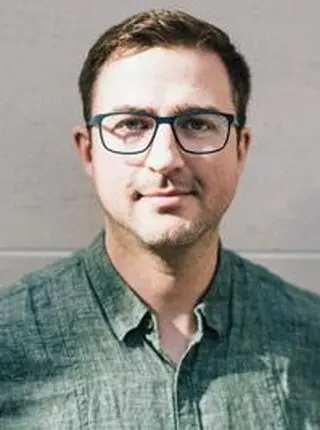
Shane Harding earned his PhD in Medical Biophysics in the lab of Robert Bristow at the University of Toronto. He completed his Postdoctoral work on mechanisms of communication between DNA damage and immune responses in the Greenberg Lab in 2018. Dr. Harding authored multiple papers during his time in the lab, including a landmark study in Nature on DNA damage and immune activation (see bibliography). Shane is currently an Assistant Professor at the Princess Margaret Cancer Centre, University Health Network, and the Dept. of Medical Biophysics at the University of Toronto in Toronto, Canada.
Namwoo (Will) Cho

Namwoo (Will) Cho completed his undergraduate studies at Harvard Medical School, and joined the Greenberg lab in 2013. Will authored multiple publications during his time in the lab, most notably as first author on a paper showing a molecular basis underlying the preference for recombination between nonsister telomeres during ALT (Cho NW, et. al., Cell, 2014; and see bibliography). He received the Saul Winegrad Award for Outstanding Dissertation, 2016, for his thesis defense (Homologous Recombination-Directed Mechanisms of Alternative Lengthening of Telomeres). Since leaving the lab, Will completed a Preliminary Medicine Internship at St. Mary’s Medical Center, San Francisco, CA, and a Radiation Oncology Residency in the Holman Research Residency program in Radiation Oncology at UCSF, as well as a fellowship in Matthew Spitzer’s lab. Namwoo will begin his independent research career as an Assistant Professor in the Department of Radiation Oncology at UCSF.
Vidhya Krishnamoorthy
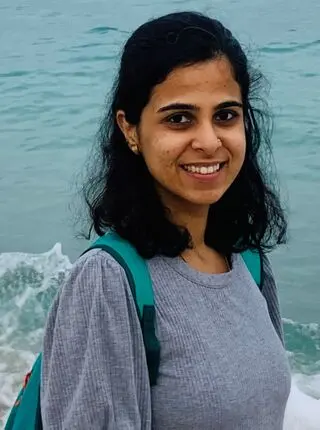
Dr. Krishnamoorthy received her B.Sc. (2009) and M.Sc (2011) in Biotechnology from the University of Mumbai, India where she carried out research on genetic markers influencing the incidence of sickle cell disease in tribal populations of India. She started her Ph.D. at CSIR-Centre for Cellular and Molecular Biology, Hyderabad, India and joined the group of Dr. Veena K Parnaik. Her research focused on the role of E3 ubiquitin ligases in the turnover of nuclear envelope proteins, lamins, and their interactors and understanding their role in the pathophysiology of nuclear envelopathies. Her work resulted in two first-author publications (Krishnamoorthy V, et. al., Biochem Biophys Res Commun. 2018; and Krishnamoorthy V, et. al., Biochem Biophys Acta Mol Cell Res. 2018). She received her Ph.D. in 2019, and joined the Greenberg lab as a postdoc in March 2019, where she studied the role of AAA+ ATPases in DNA replication and repair. Vidhya completed her work in the lab March 2024, and has joined Nava Therapeutics.
Lei Tian, PhD
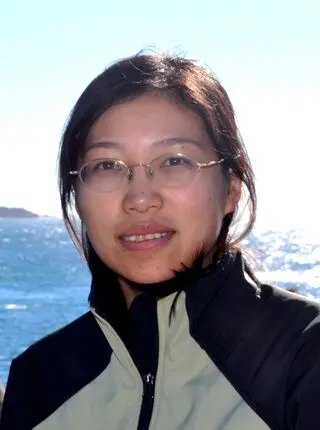
Dr. Tian received her Bachelor of Medicine (MBBS) and master's degree in Hematology from Tongji Medical College in China. She went on to obtain her PhD in Toxicology from University of Kentucky, focusing on DNA mismatch repair mechanism. In the Greenberg lab, Dr. Tian's work focused on the deubiquitinating enzyme’s function in DNA repair and inflammation signaling. She has published first-author papers in Cancer Discovery that identified mutations in BRCA1 as a cause of Fanconi Anemia and in Nature that described a new mechanism of communication between metabolic control of deubiquitinating enzyme activity and immune responses. Dr. Tian is now a senior scientist at Esai Pharmaceuticals.
Mischa Li Covington
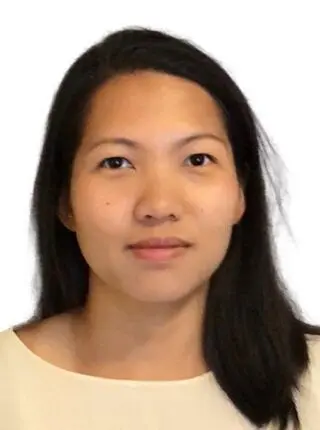
Mischa completed her MD/PhD in the Greenberg lab, defending her thesis "TIP60-dependent histone acetylation promotes DNA repair by homologous recombination" on November 13, 2018. She came to Penn after completing her undergraduate research at Stanford University School of Medicine. During her time in the Greenberg lab, she was the first author on an article that showed phosphorylation directs TIP60-dependent acetylation to promote homologous recombination and maintain genome stability (Li M, et. al., Mol Cell Biol, 2018). Mischa is currently a Clinical Pathology resident doctor at Brigham and Women's Hospital in Boston, MA.
Robert Dilley
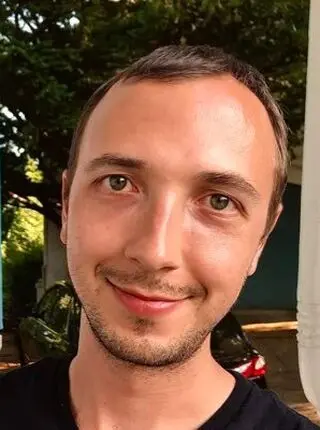
Robert Dilley obtained his Bachelor’s of Science from The Johns Hopkins University in 2011. He began his Graduate studies at UPenn in 2012 and joined the Greenberg lab in 2014. He authored several papers while in the lab, one of which as a first author showed that inception of telomere damage recognition by the break-induced replisome orchestrates homology-directed telomere maintenance (Dilley R, et. al. Nature, 2016). He received the Saul Winegrad Award for Outstanding Dissertation in 2019 for his thesis "Mechanisms of Telomere Repair Synthesis." After completing his medical school studies in May of 2021, Robert completed his training at the Massachussetts General Hospital for Internal Medicine in the physician-scientist program. He then continued training at MGH for Hematology-Oncology, and is now a Postdoctoral Fellow in Johannes Walter’s lab at Harverd Medical School/HHMI.
Jenny Stundon, MD, PhD

Jenny Stundon attended Bryn Mawr College for undergraduate, then attended graduate school at Princeton University and completed her medical degree at Rutgers University. She completed her pediatric residency training at CHOP. She completed a pediatric hematology and oncology fellow at CHOP and a research fellowship in the Greenberg lab. She is currently a clinical reviewer in the sarcoma, tissue agnostic and gastric cancer division of the FDA.
Qinqin Jiang
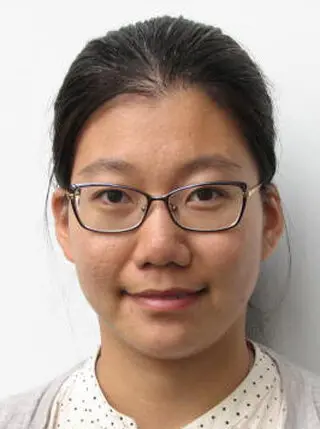
Qinqin Jiang obtained her Bachelor’s of Science from University of Hong Kong, Hong Kong in 2011. She defended her thesis "Molecular Recognition at DNA Damage Sites" on April 6, 2018. Qinqin has a first author paper on the BRCA1-A complex in Genes & Development (Jiang Q et al., Genes Dev, 2015) and a first author review article (Jiang Q and Greenberg RA, J Biol Chem., 2015). Qinqin is currently a Research Fellow in Nobel Laureate, Dr. Bill Kaelin’s lab at the Dana Farber Research Institute.
Yaroslav Morozov
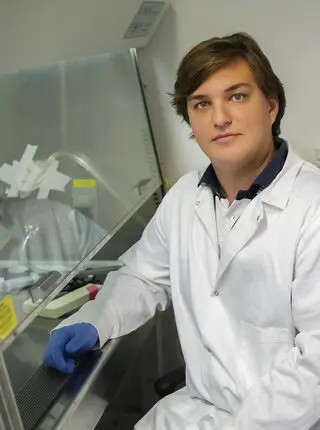
Yaroslav Morozov PhD earned his PhD at Rowan University and did his postdoctoral research in the Greenberg lab from 2019-2021 while investigating the structural determinants of the BRCA1-A complex. He is now a Principal Scientist at Sanofi Pharmaceuticals.
Niraj Shanbhag
Niraj Shanbhag earned his Bachelors of Science from Cornell University in 2005. Niraj was first author of an article in Cell that delved into an ATM-dependent transcriptional silencing program in cis to DSBs (Shanbhag N, et. al., Cell 2010). Upon completing his thesis research in the Greenberg Lab in 2012, Niraj received the Saul Winegrad Award for Outstanding Dissertation, titled "Communictaion between DNA damage and transcription." Niraj went on to complete a Postdoctoral Fellowship at Gladstone Institutes in San Francisco, CA. He is currently the Medical Director at Vertex Pharmaceuticals in Boston, MA.
Jeffrey Patterson-Fortin

During his time as a graduate student in the Greenberg lab, Jeffrey Patterson-Fortin studied Ubiquitin targeting and editing in cellular responses while on a Canadian Institute of Health Research Fellowship. Jeffrey was first author on multiple papers on the BRCA-A complex, and made major advances towards understanding how JAMM domain DUB activity is regulated at the biochemical and cellular levels (Patterson-Fortin J, et. al., J Biol Chem, 2010; Shao G, Patterson-Fortin J, et. al., Genes Dev, 2009; Solyom, Patterson-Fortin J., et al. Sci Transl Med, 2012; Zheng et al. Cell Rep, 2013). Upon completing his thesis in 2015, he went on to complete a Residency of Internal Medicine/Genetics at Johns Hopkins Hospital, and Residency of Oncology and postdoctoral fellowship (Alan D’Andrea post-doc mentor) at the Dana-Farber Cancer Institute, where he is currently a Clinical Fellow in Oncology.
Kara Coleman

After obtaining her Bachelor’s degree in neuroscience from the College of William & Mary, Kara completed her doctorate in the Greenberg Lab on DNA end resection in 2011. During that time, she authored first-author papers with Dr. Greenberg (Coleman K, and Greenberg RA, J Biol Chem, 2011; and Nikkilä J, et. al., Oncogene, 2009). She went on to develop medical education content for ETHOS Health Communications, and was promoted to Scientific Director. Kara is now Project Director of Biomedical Programs at The Pew Charitable Trusts.
Eva Hum, PhD
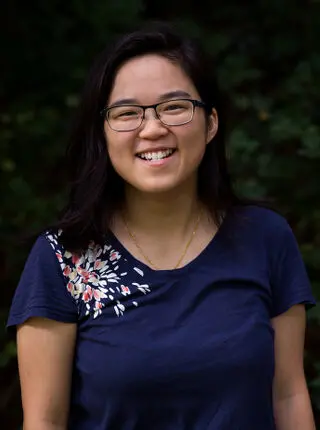
Dr. Hum received her Bachelor of Science from University of Wisconsin-Madison and her Ph.D. in Genetics and Genomics from Duke University. For her graduate work, she studied the molecular mechanism of homologous recombination in baker’s yeast with Dr. Sue Jinks-Robertson. In the Greenberg lab, Dr. Hum addressed fundamental questions regarding the mechanisms underlying micronuclei formation and human cancer genome evolution. She is now working at a biotech company in Singapore.
Genze Shao
Genze Shao completed his PhD studies at Peking Union Medical School and performed postdoctoral studies in the Greenberg lab from 2007-2010, where he worked on DNA damage response functions of the BRCA1-A complex. During that time, he produced first-authored papers revealing a Rap80-BRCC36 dependent pathway important to DNA repair (Shao G, et. al., Proc Natl Acad Sci USA, 2009) and the discovery of the MERIT40 protein (Shao G, et al., Genes Dev., 2009). He became an Assistant Professor at the Peking Union Medical School in 2010 and was promoted to Associate Professor in 2014.
Jiangbo Tang
Jiangbo Tang completed his PhD studies at the University of Pittsburgh with Dr. Robert Sobol. He performed postdoc studies of chromatin mechanisms of DNA repair in the Greenberg lab from 2010-2013. Jiangbo was first author of a paper during this time that outlined a role for 53BP1 in promoting homologous recombination (Tang J, et. al., Nat Struct Mol Biol., 2013). He joined Alliance Pharma and worked there for three years before moving to Next Advance as an operations manager. He then started his own company, CisNovo that sells consumables and instruments to research laboratories. Dr. Tang is currently a staff scientist at Regeneron.
Troy Messick

Troy Messick completed his Postdoctoral Fellowship in the Greenberg Lab in 2009 on the BRCA1-A complex. During this time, he authored a paper on MERIT40 with fellow lab members (Shao G, et. al, Genes Dev, 2009), and was first author of a review with Dr. Greenberg discussing how ubiquitin structures may influence DNA damage responses (Messick T, and Greenberg RA, J Cell Biol., 2009). Troy spent two years after this as Vice President of Vironika LLC, a drug discovery company, before becoming an Investigator at The Wistar Institute in 2011. He is currently a Staff Scientist and Program Director at The Wistar Institute.
Vibhor Gupta
Vibhor Gupta performed his PhD studies in India while studying metabolism. Dr. Gupta performed his postdoctoral reserach in the Greenberg lab from 2012-2015 while studying metabolic control of ubiquitin dependent innate immune responses. Notably he was a first author on a paper suggesting a therapeutic use for BRISC inhibitors in treating pathophysiological processes driven by elevated IFN responses (Zhang Hui, Gupta V, et. al., Cell Rep., 2013). He is now the Associate Director of Cell & Gene Therapy at Absorption Systems.
Laura Butler
Laura Butler performed her PhD studies with Dr. Jo Morris at the University of Birmingham. She performed postdoctoral research in the Greenberg lab from 2014-2016 working on chromatin mechanisms of DNA repair. She then worked as a scientist at ATRIN Pharmaceuticals and is now a Team Leader at PhoreMost LTD, a new-model drug discovery company based in Cambridge, UK.
Bernadette Aressy
Bernadette Aressy performed her PhD studies on cell cycle control of DNA repair in Toulouise, France. She was a postdoc in the Greenberg lab from 2010 to 2013. Bernadette published several papers while in the lab, notably on the role of MERIT40 on ICL repair (Jiang Q, et. al., Genes Dev., 2015) and a first-author commentary on DNA damage (Aressy B, and Greenberg RA, Curr Biol., 2012) She is now a consultant with ZS Associates.
Xuejiao Yang, PhD
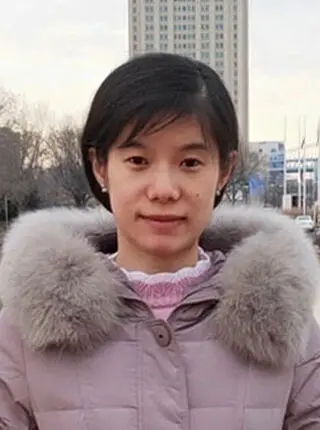
Dr. Yang received her B.S. in the School of Life Sciences, Jilin Normal University, Siping, China, followed by her M.S. in the Key Laboratory of Molecular Epigenetics of MOE, Unit of Plant Epigenetics, Institute of Genetics & Cytology, Northeast Normal University, Changchun, China. She then went on to obtain her PhD in the Laboratory of Transcription, Chromatin and DNA Repair, Section for Functional Genomics, Department of Biology, Faculty of Science, University of Copenhagen, Copenhagen, Denmark. There she studied regulatory mechanisms of DNA repair factors in response to DNA damage in the budding yeast Saccharomyces cerevisiae. Dr. Yang's research in the Greenberg lab was to dissect the regulatory function of deubiquitinating enzyme BRCC36 within BRCA1-RAP80 complex in recognizing and responding to DNA damage, and explore the regulatory mechanism of Shieldin complex in determining DNA repair pathway choice. Dr. Yang is currently exploring biotech options in China.
Moniher Deb

As the recipient of the Tarble Summer Research Fellowship (Swarthmore College, Biology dept.) over the summer of 2018, Monie conducted cancer genetics research under Prof. Dawn Carone. During the following year, she continued researching a non-coding high-copy tandem RNA sequence of interest using cancerous PC3 cells. She recently graduated from Swarthmore College with a B.A., in Biology and Psychology. Currently, Monie is a Research Specialist working with Dr. Priyanka Verma in the Greenberg Lab. Monie authored a paper with Dr. Verma (Verma P, et. al., Nat Cell Biol, 2021) that identified ALC1 as a promising new drug target for BRCA mutant cancers. During her time in the lab, Monie examined the underlying mechanisms of genomic stability various CRISPR based genetic screens. She is currently working as a research assistant in a psychology lab at CHOP.
Vaughn Thada
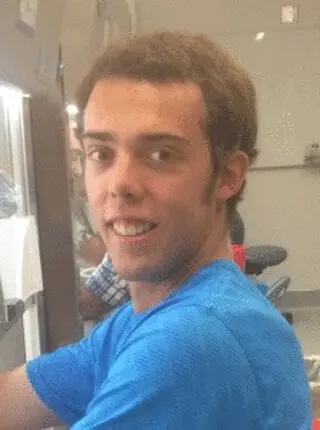
Originally from Owatonna, MN, Vaughn received his BA in Biology from Augustana University in 2015, where he achieved a first-author credit on an article (Thada V et. al., J Cell Mol Med, 2016). He received his Ph.D. from Vanderbilt University in 2021, where he studied the mechanism and structural determinants of ATR activation and checkpoint signaling. His work there in the lab of Dr. David Cortez earned him two additional first-author publications (Thada V, Cortez D, J Biol Chem, 2021; and Thada V, Cortez D, J Biol Chem, 2019).
In the Greenberg lab, Vaughn worked on understanding how three-dimensional cellular interactions influence the DNA damage response. He is now working on science policy. Outside of the lab, Vaughn enjoys golfing, kayaking, and hiking.
Smita Bhutda
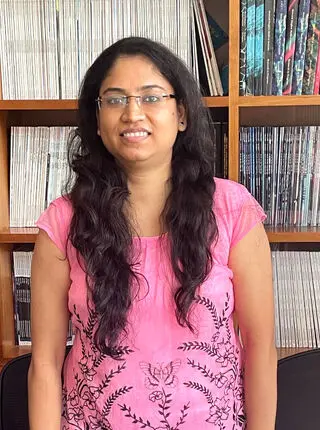
Dr. Smita Bhutda received her B.Sc. (2010) and M.Sc. (2011) in Biotechnology from University of Mumbai, India. She then joined the National Institute of Research in Reproductive Health (NIRRH-ICMR), Mumbai, India, where she held the position of junior research fellow. Her study was focused on investigating stem cells in the adult mouse ovary, effect of chemotherapy on them, and their potential to differentiate into germ cells. She received her PhD (2021) in cellular microbiology from Indian Institute of Technology, Bombay, India. Her PhD work was focused on understanding a universal approach of bacterial ubiquitination for sensing diverse intracellular pathogens. In the Greenberg Lab, Smita is looking into Homologous Repair (HR) for double-stranded DNA (dsDNA) breaks at the molecular level, with emphasis on disassembly of NHEJ protein complexes. Furthermore, she is aiming to understand interaction between BRCA1 and A-complex.
Parul Dutta

Parul received her B.Sc (2008) and M.Sc (2010) in Zoology from Banaras Hindu University, Varanasi, India, where she studied the role of epigenetic regulation of the Wnt4 promoter region in determining the sex of Mus musculus embryos in the laboratory of Prof. Rajiva Raman. Following that, she moved to National Centre for Cell Sciences, Pune, India to pursue her Ph.D. in the lab of Dr. Manas Kumar Santra. There, she studied the role of ubiquitin proteasome system in regulating the cell cycle progression and maintaining genomic integrity. Her work there resulted in a first-author publication (Dutta P, et al., J Biol Chem., 2019). Parul then joined a cancer genomics-based healthcare firm, PierianDx, India, where she explored the information related to various mutations observed in a variety of cancers and precision medicine-based therapeutic approaches. Parul was a postdoctoral researcher in the Greenberg lab from January 2022 through October 2023, during which time she explored the role of AAA+ ATPases in DNA replication and in maintaining genomic integrity. She is currently completing her postdoctoral research in the Netherlands.
Timothy Lippert, PhD

Tim was born and raised in Nuernberg, Germany. He traveled to the United Kingdom to study a B.Sc. in Immunology at the University of Edinburgh followed by a PhD in Clinical Sciences (Immunology and Inflammation) at Imperial College London under the mentorship of Simon Boulton. Throughout his time as a graduate student he was associated with the Francis Crick Institute, where he also held a position as laboratory research scientist.
His PhD work was focused on the modulation of homologous recombination at telomeres in response to infection with oncogenic Kaposi's Sarcoma Herpesvirus. In the Greenberg lab, Tim investigated the contribution of innate immune signaling to anti-tumor immunity in the context of BRCA-deficient cancer. This work built on his expertise at the intersection between the fields of cellular responses to DNA damage, immunology, and virology. He authored a review with Dr. Greenberg on the "Abscopal Effect" in JCI, describing mechanisms underlying communication between the DNA damage and immune responses during cancer therapy (Lippert T, Greenberg RA, J Clin Invest, 2021). Tim left the lab to return to Germany July 2024.
Jinghan Holly Qiu

Jinghan received her BSE degree in Bioengineering at University of Pennsylvania School of Engineering and Applied Science in 2024. She joined the Greenberg lab in May 2020 as an undergraduate researcher, dedicating her studies to understanding DNA repair mechanisms. With a strong interest in cancer therapy and a focus on exploring changes in cell sensitivity to cancer medications, Jinghan currently worked with Arindam Datta looking into the roles of BRCA1-A complex in the regulation of DNA double-strand break repair in an ATM deficient background. Jinghan is now in the Penn Bioengineering Graduate School pursuing an MD degree to pursue a career in surgical oncology, where she can incorporate cutting-edge cancer research findings to deliver personalized treatment. Outside the lab, Jinghan enjoys playing the piano and participating in theater arts.
Aravind Krishnan

Aravind completed his B.A. in Molecular and Cell Biology and B.S. in Economics, with Concentrations in Statistics and Healthcare Management & Policy, through the University of Pennsylvania's Vagelos Program in Life Sciences & Management (LSM). He joined the Greenberg Lab in September 2021, where he worked to elucidate the mechanisms underlying Alternative Lengthening of Telomeres and the interaction between ALT and the telomerase-mediated pathway in cancer cells. Aravind is fascinated with mechanisms of DNA repair in response to DNA damage, and is interested in understanding cancer and other genetic diseases through the lens of DNA damage, with an eye towards developing novel strategies that can promote DNA damage repair for early-stage disease treatment, and even prevention. Aravind is now an MD-PhD student at Stanford to continue this line of research on DNA damage and repair in the context of cancer and other diseases, and translate this basic science into clinically-applicable therapeutic strategies that more effectively target the root cause of these diseases. Outside of the lab, Aravind loves playing basketball and spending time in nature.

